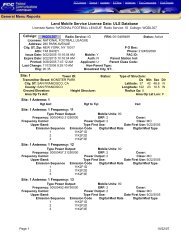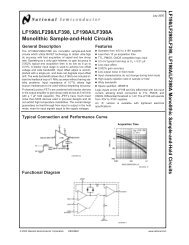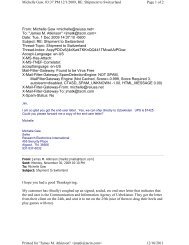Stands Among The World's Most Stands Among The ... - Index of
Stands Among The World's Most Stands Among The ... - Index of
Stands Among The World's Most Stands Among The ... - Index of
You also want an ePaper? Increase the reach of your titles
YUMPU automatically turns print PDFs into web optimized ePapers that Google loves.
BRITISH CONCENTRATION CAMPS (EUROPE AND GREAT BRITAIN)<br />
"Together with a group <strong>of</strong> journalists, Moorehead visited the concentration camp <strong>of</strong> Bergen-Belsen in<br />
1945, shortly after discontinuation <strong>of</strong> action. By reason <strong>of</strong> heavy bombing, road communications had<br />
been destroyed and no supplies had reached the camp; typhoid fever ensued and hundreds <strong>of</strong> prisoners<br />
had died as a consequence. <strong>The</strong> allies arrived on the scene and found a terrible situation. <strong>The</strong>y<br />
delivered provisions and medicine, cremated the dead and burned down the contaminated barracks.<br />
<strong>The</strong>y imprisoned the guards and tortured them and they were so possessed by propaganda about<br />
German 'Huns', that they obviously greatly enjoyed to demonstrate their atrocities to the visiting<br />
journalists. Moorehead reports, 'A young British medical <strong>of</strong>ficer and a captain <strong>of</strong> engineers managed<br />
the camp. <strong>The</strong> captain was in the best <strong>of</strong> moods. When we approached the cells <strong>of</strong> gaoled guards, the<br />
sergeant lost his temper. <strong>The</strong> captain said: 'This morning we had an interrogation. I'm afraid the<br />
prisoners don't look exactly nice.'<br />
<strong>The</strong> cells were opened for the journalists. <strong>The</strong> prisoners lay there, crumpled, covered with gore. <strong>The</strong><br />
man next to me made vain attempts to get to his feet and finally managed to stand up. He stood there,<br />
trembling, and tried to stretch out his arms as if fending <strong>of</strong>f blows.<br />
'Up!' yelled the sergeant. 'Come <strong>of</strong>f the wall.'<br />
<strong>The</strong>y pushed themselves <strong>of</strong>f from the wall and stood there, swaying. In another cell the medical<br />
<strong>of</strong>ficer had just finished an interrogation. 'Up!' yelled the <strong>of</strong>ficer. 'Get up.'<br />
<strong>The</strong> man lay in his blood on the floor. He propped two arms on a chair and tried to pull himself up.<br />
A second demand and he succeeded in getting to his feet. He stretched his arms towards us: 'Why<br />
don't you kill me <strong>of</strong>f?' he moaned.<br />
'<strong>The</strong> dirty bastard is jabbering this all morning.' the sergeant stated."<br />
Cyril Connolly, <strong>The</strong> Golden Horizon, Weidenfeld and Nicholson, London<br />
Note: I have not personally read this book and the account above is a translation from English to<br />
German and back again which accounts for grammatical flaw only.<br />
"During the latter half <strong>of</strong> 1945 (many months after the war's end), I was with British troops guarding<br />
suspect Nazi civilians living on starvation rations in a camp called Sennelager. <strong>The</strong>y were frequently<br />
beaten and grew as thin as concentration camp victims, scooping handfuls <strong>of</strong> swill from our waste<br />
bins. <strong>The</strong>y could be shot on sight if they ventured close to the perimeter fence. It was a common<br />
trick to throw a cigarette just inside the fence and shoot any prisoner who tried to reach it."<br />
A.W Perkins, Holland-on-Sea. Daily Mail, 22nd April 1995<br />
"Great Britain in August, 1946, 15-months after the war's end, according to the International Red<br />
Cross, had 460,000 German prisoners-<strong>of</strong>-war slaving for her."<br />
John Thompson, Geneva, August 24th 1946. Chicago Tribune Press Service<br />
"... and in the case <strong>of</strong> France bringing in a handsome pr<strong>of</strong>it for the War Office. 'Upon embarking<br />
from our ports the prisoners were given to understand that they were being sent home; when they<br />
learned upon arrival at British and French ports that they were to be worked indefinitely as slaves,<br />
they became sullen. As one British <strong>of</strong>ficer said: 'It takes us several weeks to bring them around to<br />
where they will work hard.' - Arthur Veysey, London, May 28th 1956. Chicago Tribune Press Service<br />
162
















